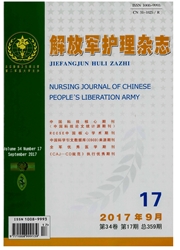

 中文摘要:
中文摘要:
目的探讨心理护理对手术室患者心理状态及生理功能的影响。方法选取100例手术患者随机分为观察组和对照组各50例,分别实施手术室综合心理护理和常规手术室护理干预.对比两组患者心理状态和血压、心率的变化。结果两组患者在护理干预前SCL90各项得分比较,差异均无统计学意义(P〉0.05),干预后两组各项症状得分均下降,观察组焦虑、抑郁、恐惧、强迫症状、躯体化、敌对和偏执的得分显著低于对照组(P〈0.05)。两组在手术准备至术毕时收缩压、舒张压和心率均有显著的变化(P〈0.05),但两组在手术准备时和手术进行20min收缩压、舒张压和心率比较,差异均有统计学意义(P〈0.05),观察组指标显著低于对照组,术毕时两组各项指标比较,差异均无统计学意义(P〉0.05)。两组满意度评价得分和满意率比较,差异有统计学意义(P〈0.05)。结论实施综合心理护理有助于手术患者心理状态和生理指标的平稳,减轻心理和生理的不适症状,提高患者对护理的满意度。
 英文摘要:
英文摘要:
Objective To investigate the effect of psychological care for psychological state and physiological functions patients of the operating room. Methods All of 100 cases of surgery were randomly divided into observation group and control group, 50 cases were implemented comprehensive psychological care and routine operating room operating room nursing intervention, compared two groups of patients psychological status and blood pressure and heart rate changes. Results The patients in nursing SCL90 the scores before the intervention, the difference was not statistically significant (P 〉 0.05), the two groups after the intervention of the symptom scores decreased in the observation group anx- iety, depression, fear, obsessive-compulsive symptoms, somatic technology, hostility and paranoid scored significantly lower than the control group (P 〈 0.05). The surgery preparation to surgery systolic blood pressure, diastolic blood pres- sure and heart rate changes were significant (P 〈 0.05), but the two groups in the surgery preparation and surgery 20min systolic blood pressure, diastolic blood pressure and heart rate, the difference was statistically significant (P 〈 0.05), the observation group was significantly lower than the control group indicators, the indicators of surgery when the two groups, the difference was not statistically significant (P 〉 0.05). Two satisfaction evaluation scores and satisfaction rate, the difference was statistically significant (P 〈 0.05). Conclusion Implementation of comprehensive psychological care to help patients with perioperative psychological and physiological indicators of stable, reduce the psychological and physiological symptoms, improve patient satisfaction with care.
 同期刊论文项目
同期刊论文项目
 同项目期刊论文
同项目期刊论文
 期刊信息
期刊信息
